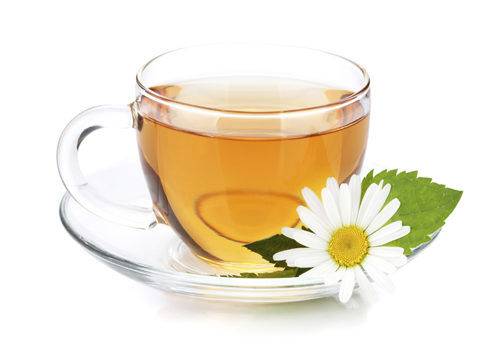
If you look down the tea aisle of any grocery store, you’re likely to find an array of teas offering remedies for everything from congestion to indigestion. Many of us may have heard of medicinal beverages such as herbal teas, and as shoppers increasingly use them for wellness, it would appear there is some truth to these health claims. The question is, how much truth?
What Is an Herbal Tea?
The most common type of medicinal beverage you are likely to encounter is herbal tea. Unlike normal teas, which are created by steeping the leaves of the tea plant in hot water, herbal teas are brewed from the leaves, stems, flowers, roots, bark or rhizomes of a variety of herbs (1). As a result, these blends, also known as tisanes, are more concentrated, allowing a direct infusion of the herb and any properties it might have. This makes the health benefits more powerful and immediate than those from a green tea or black tea. Anecdotal reports suggest that some shoppers have had great success addressing problems like sore throats or headaches with herbal teas in a matter of minutes (2).
Medicinal Beverages: The Benefits
Herbal medicine has been in practice since ancient times, with herbal teas being used in China as far back as 2000 B.C. (3). The medicinal beverages we use today are often made using the same techniques, but modern technology and research show there may be more to the herbs that they consist of.
As an example, many people may have heard of chamomile tea being taken to help with an upset stomach, but recent studies have shown that it is capable of far more than that. A randomized double-blind study of 57 patients with generalized anxiety disorder showed that over the course of eight weeks, those who drank chamomile tea experienced a significant alleviation in anxiety symptoms versus those who did not (4). Another study showed that chamomile inhibited the release of inflammatory prostaglandin molecules from white blood cells, similarly to some non-steroidal anti-inflammatory drugs (5). An additional study shows the flavonoid apigenin, which is most abundant in chamomile flowers, inhibits gastrointestinal cancer growth and blood supply to cancerous tumors (6). Though like all herbs, chamomile cannot cure, prevent or treat diseases, the benefits of this particular herb may go well beyond easing a simple stomachache.
Chamomile is only one of many of multi-purpose herbs, though. One herbal tea manufacturer uses 11 herbs, including fennel, peppermint and the aforementioned chamomile, to formulate over 30 teas, specifically designated for health purposes such as pregnancy care, gas relief and seasonal allergy relief (7). With this type of versatility available and more uses for herbs coming out of the scientific community, we may see a throwback to the apothecaries of old: where people can come into a shop for an ailment and purchase an herbal tea that will alleviate their symptoms.
Alternative Options
While herbal teas are one of the most common items of discussion regarding medicinal beverages, there are other options available that are rising in popularity. One of these alternative beverages is kombucha, a tea variant that is poised to reach $500 million in total sales by 2015 (8). Made by mixing and fermenting a colony of yeast and bacteria with tea and sugar, kombucha is purported to have a wide array of benefits. Kombucha is said to clear acne and headaches, aid with constipation and offer general detoxifying effects. There are also studies on kombucha taking place involving cancer, HIV/AIDS and diabetes, though more time will be needed to see how it affects those conditions (9).
One thing to note about kombucha is that due to the fermenting process, it contains trace amounts of alcohol. It also may have some negative effects including stomach upset and infections, but these are largely attributed to home brewers using unsanitary brewing conditions. However, one thing to consider with both store-brought kombucha and even other herbal teas are allergic reactions. Due to the concentrated nature of medicinal beverages as opposed to other drinks, buyers will still need to be careful of side effects the same way as they would with the treatments that these beverages emulate. Shoppers should talk to their healthcare providers about any questions they may have. WF
References
1. Swanson Health Products Health Blog, “Why Herbal Teas Aren’t Considered ‘Real Tea,’” www.swansonvitamins.com/blog/health-news-and-opinion/why-herbal-teas-are-not-considered-real-tea, accessed May 12, 2014.
2. NaturalNews, “Medicinal Herbal Teas Taking the Mainstream Beverage Industry by Storm,” www.naturalnews.com/031565_medicinal_herbs_tea.html, accessed May 12, 2014.
3. Herbaltea.com, “A Brief History of Tea,” www.herbaltea.com/tea_history, accessed May 12, 2014.
4. J.D. Amsterdam et al., “A Randomized, Double-Blind, Placebo-Controlled Trial of Oral Matricaria Recutita (Chamomile) Extract Therapy for Generalized Anxiety Disorder,” J. Clin. Psychopharmacol. 29 (4), 378–382 (2009).
5. J.K. Srivastava, M. Pandey and S. Gupta, “Chamomile, A Novel and Selective COX-2 Inhibitor with Anti-Inflammatory Activity,” Life Sciences, 85 (19-20), 663–669 (2009).
6. E.C. Lefort and J. Blay, “Apigenin and its Effect on Gastrointestinal Cancers,” Mol. Nutr. Food Res. 57 (1), 126–144 (2013).
7. Traditional Medicinals, “All Products.” www.traditonalmedicinals.com/products, accessed May 14, 2014.
8. R. Latif, “Kombucha Class Action Suits Settled with GT’s, Honest Tea,” BEVNET, www.bevnet.com/news/2011/kombucha-class-action-suits-settled-with-gts-honest-tea, accessed May 13, 2014.
9. WholeFoods Magazine Online, “Kombucha: The Twisted Tea.” www.wholefoodsmagazine.com/columns/consumer-bulletin/kombucha-twisted-tea, accessed May 13, 2014.
Published in WholeFoods Magazine, July 2014










